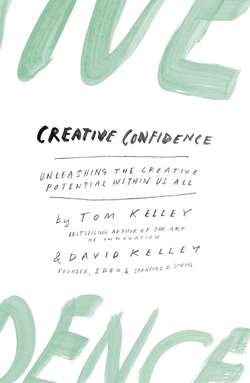Читать книгу Creative Confidence: Unleashing the Creative Potential Within Us All - David Kelley - Страница 23
URGENT OPTIMISM
ОглавлениеWe can all learn something about effort and failure from the world of gaming. Author, futurist, and game designer Jane McGonigal talked to us recently about how video gaming can spark its own form of creative confidence. Jane makes a convincing case that harnessing the power of video games can have a major impact on life in the real world. In the realm of video games, the level of challenge and reward rises proportionately with a gamer’s skills; moving forward always requires concentrated effort, but the next goal is never completely out of reach. This contributes to what Jane calls “urgent optimism”: the desire to act immediately to tackle an obstacle, motivated by the belief that you have a reasonable hope of success. Gamers always believe that an “epic win” is possible—that it is worth trying, and trying now, over and over again. In the euphoria of an epic win, gamers are shocked to discover the extent of their capabilities. As you move from level to level, success can flip your mindset to a state of creative confidence. We’ve all seen this kind of persistence and gradual mastery of skills in children—from toddlers learning to walk to kids learning how to shoot a basketball.
Tom witnessed urgent optimism in action one Christmas morning when his teenage son Sean opened up a Tony Hawk skateboard video game and started trying it out. In addition to the usual on-screen action, the game comes with a controller that looks exactly like a real skateboard—minus the wheels. So there was Sean, balancing on a full-sized skateboard in the family room, surrounded by three generations of Kelleys. The family watched failure after failure as Sean’s character on screen smashed into brick walls, skidded off of railings, and collided with other skaters. Potentially more embarrassing, Sean himself fell off the skateboard controller several times, nearly crashing through the glass coffee table beside him on the floor. But neither the on-screen calamities nor the occasional loss of balance in the physical world fazed Sean one bit. In the social context of the gaming world, he wasn’t really failing—despite the noisy on-screen sound effects of his spectacular falls. Sean knew that he was on a path to learning. In fact, since reading about a video game is not much help, he was on essentially the only path available to gaining expertise.
By adapting the best attributes of gaming culture, we can shift people’s view of failure and ratchet up their willingness and determination to persevere. We just need to hold out a “reasonable hope of success,” as well as the possibility of a truly epic win. For example, in working with colleagues or on a team, we’ve found that if team members believe that every idea gets fair consideration, and that a meritocracy allows their proposals to be judged across divisional and hierarchical lines, they tend to put all of their energy and their creative talents to work on ideas and proposals for change. They work harder, persist longer, and maintain their urgent optimism when they believe victory is just around the corner.
But even after you overcome your initial fear of failure and gain creative confidence, you need to continue stretching yourself. Like a muscle, your creative abilities will grow and strengthen with practice. Continuing to exercise them will keep them in shape. All innovators need to make creative leaps: What need should you focus on? Which idea do you go with? What should you prototype? That is where experience and intuition come in.
Diego Rodriguez in his blog Metacool says that innovation thinkers often use “informed intuition” to identify a great insight, a key need, or a core feature. In other words, relentless practice creates a database of experience that you can draw upon to make more enlightened choices. When it comes to bringing new stuff into the world, Diego argues that the number of product cycles you’ve gone through (what he calls “mileage”) trumps the number of years of experience. A twenty-year veteran of the auto industry who works several years on each new vehicle before it goes to market might have experienced far fewer cycles than a software developer working just two years on mobile apps that ship every couple of months. Once you have gone through enough rapid innovation cycles, you will gain familiarity with process and confidence in your ability to assess new ideas. And that confidence results in reduced anxiety in the face of ambiguity when you are bringing new ideas into the world.
